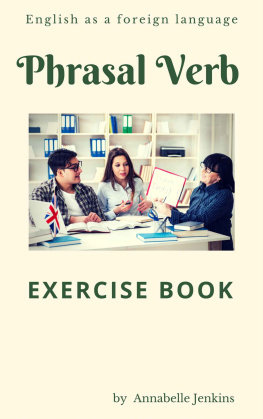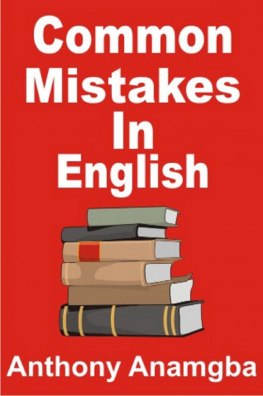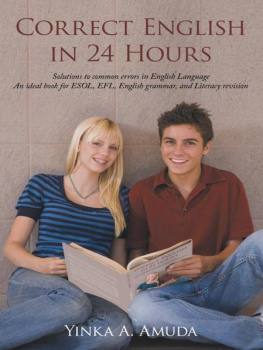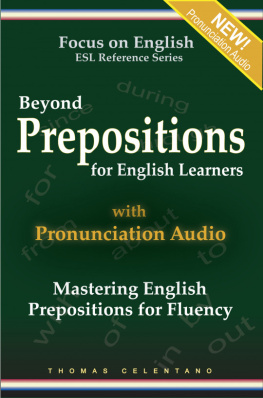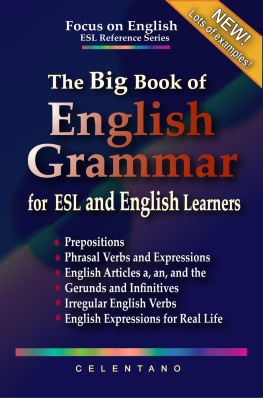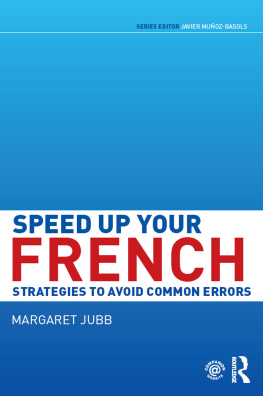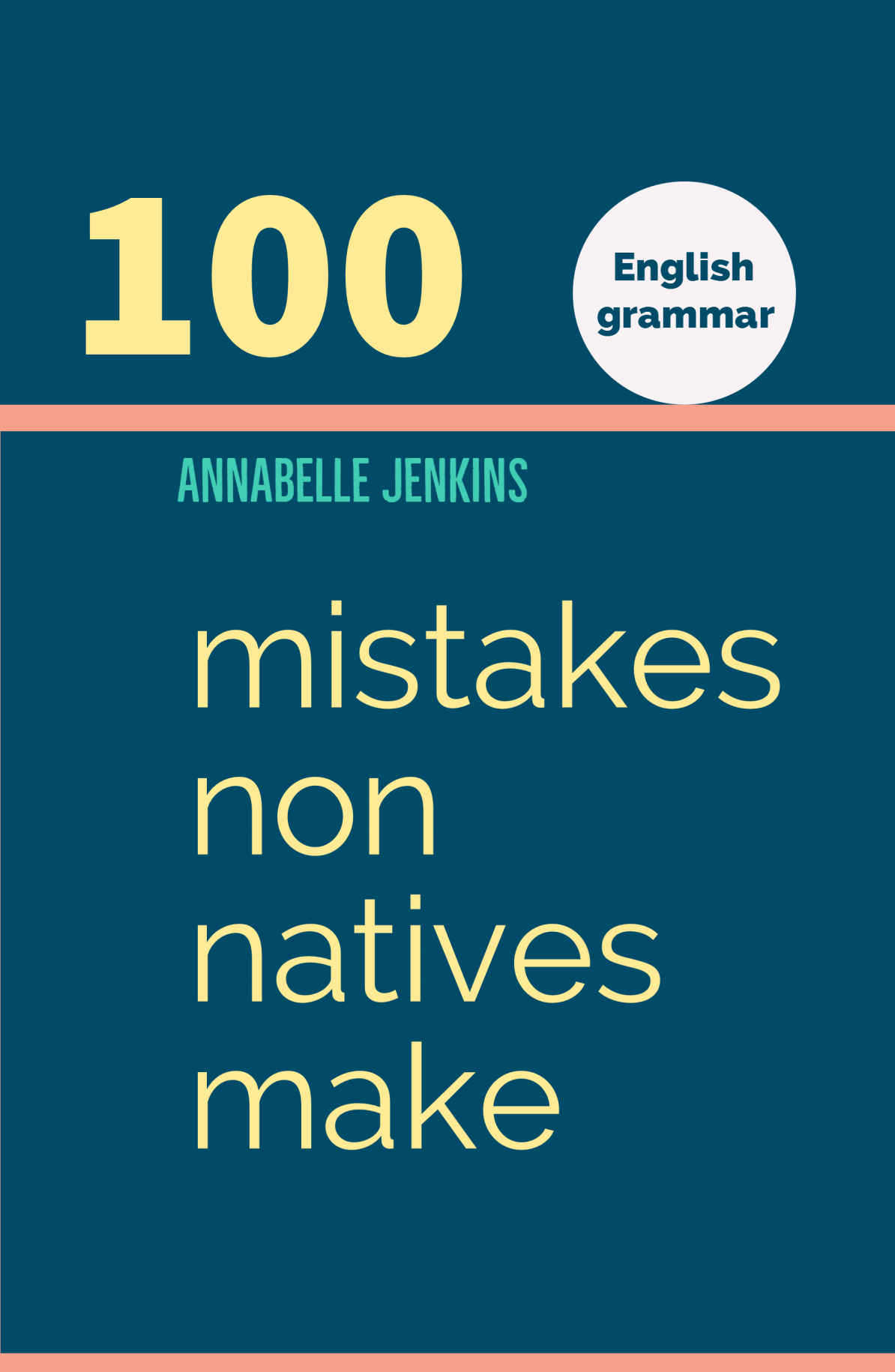English grammar - 100 mistakes non natives make
by Annabelle Jenkins
About the booklet
This little booklet deals with an assortment of the most frequent errors made in the ESL classroom around the world, ranging from missing pronouns, wrong tense, wrong prepositions, wrong word order, omission of auxiliary verb among others.
Specifically compiled for students studying English as a foreign language.
Suitable for levels A1, A2 and B1
Copyright Annabelle Jenkins 2019
All rights reserved
MISTAKE NUMBER ONE
He my brother is in London.
Mistake: double subject
Correction: My brother is in London.
We can also say he is in London, if we have previously spoken about him in the conversation or if someone asks a question.
Example: Where is your brother? Hes in London.
-O-O-O-O-O-O-O-O-O-
MISTAKE NUMBER TWO
Goodbye. Now I go to work.
Mistake: Use of the present simple instead of the present progressive.
Correction: Now I am going to work.
Use the present progressive for an action in progress at the moment of speaking.
-O-O-O-O-O-O-O-O-O-
MISTAKE NUMBER THREE
You live here?
Mistake: Omission of auxiliary verb in the question.
Correction: Do you live here?
Use do in the question in the present tense for subjects I, you, we, they. Use does for he, she, it for subjects in third person singular.
-O-O-O-O-O-O-O-O-O-
MISTAKE NUMBER FOUR
She speak English.
Mistake: Omission of s on the verb in third person singular.
Correction: She speak s English.
Remember the importance of s on the verb in third person singular in the affirmative. This is one of the most common errors English language learners make.
-O-O-O-O-O-O-O-O-O-
MISTAKE NUMBER FIVE
He dont want to come.
Mistake: Use of dont instead of doesnt, which is required in the negative in third person singular.
Correction: He doesnt (does not) want to come.
-O-O-O-O-O-O-O-O-O-
MISTAKE NUMBER SIX
I can to play the piano.
Mistake: Use of to after can.
Correction: I can play the piano.
After all modal auxiliary verbs, and can is one of them, use the base form of the verb without the to.
-O-O-O-O-O-O-O-O-O-
MISTAKE NUMBER SEVEN
We no can go.
Mistake: Wrong negative.
Correction: We cant go (cannot).
-O-O-O-O-O-O-O-O-O-
MISTAKE NUMBER EIGHT
You must to arrive early tomorrow.
Mistake: Use of to after must.
Correction: You must arrive early tomorrow.
Must is also one the modal auxiliary verbs so the base form of the verb is required without the to.
-O-O-O-O-O-O-O-O-O-
MISTAKE NUMBER NINE
Im cooking. My brother will come for lunch.
Mistake: Wrong future tense.
Correction: My brother is coming . (The fact that you are cooking lunch for your brother means that you already know hes coming. Use the present progressive for something already arranged in the future)
Remember the present progressive is formed by using the subject (My brother) + the verb be (is) + the gerund form of the main verb (coming)
-O-O-O-O-O-O-O-O-O-
MISTAKE NUMBER TEN
We go to sea every Sunday.
Mistake: Omission of the definite article the before the noun sea.
Correction: We go to the sea every Sunday.
Without the, the listener would think the speaker said, we go to see what? as in see with ones eyes.
-O-O-O-O-O-O-O-O-O-
MISTAKE NUMBER ELEVEN
He is a person very kind.
Mistake: The adjective and the noun are in the wrong position. Remember, adjectives come before the noun in English. In some languages they come after.
Correction: He is a very kind person . Very modifies kind and adds intensity to adjectives.
-O-O-O-O-O-O-O-O-O-
MISTAKE NUMBER TWELVE
When I finish my homework, in an hour or so, I go out.
Mistake: Omission of future on the second clause.
Correction: When I finish my homework, in an hour or so, I will go out .
-O-O-O-O-O-O-O-O-O-
MISTAKE NUMBER THIRTEEN
I read the book yesterday. I will bring you next Friday.
Mistake: Omission of object after the verb bring.
Correction: I read the book. I will bring you it next Friday.
The object pronoun it replaces the noun book.
-O-O-O-O-O-O-O-O-O-
MISTAKE NUMBER FOURTEEN
Is possible to change our lesson from Monday to Tuesday?
Mistake: Omission of the subject.
Correction: Is it possible to change our lesson, or more natural English would be can we change our lesson?
The subject it is required. It refers to the possibility.
-O-O-O-O-O-O-O-O-O-
MISTAKE NUMBER FIFTEEN
I heard the audio book you lent me.
Mistake: Use of the wrong verb.
Correction: I listened to the audio book you lent me.
Listen is something you do intentionally. Hear is unintentional. You can hear without listening.
-O-O-O-O-O-O-O-O-O-
MISTAKE NUMBER SIXTEEN
I have the breakfast early in the morning.
Mistake: Use of the when it is not needed.
Correction: I have breakfast early in the morning.
-O-O-O-O-O-O-O-O-O-
MISTAKE NUMBER SEVENTEEN
I watched a film at the cinema yesterday.
Mistake: Use of the wrong verb.
Correction: I saw a film at the cinema.
You watch a film on TV or on the pc, but at the cinema you see a film.
-O-O-O-O-O-O-O-O-O-
MISTAKE NUMBER EIGHTEEN
Sorry for the late.
Mistake: late is not a noun.
Correction: Sorry Im late .
To be + late
-O-O-O-O-O-O-O-O-O-
MISTAKE NUMBER NINETEEN
Can we see tomorrow for lunch?
Mistake: Wrong verb
Correction: Can we meet tomorrow for lunch.
-O-O-O-O-O-O-O-O-O-
MISTAKE NUMBER TWENTY
Next Saturday I do a party.
Mistake: Two mistakes in one - wrong verb and wrong tense.
Correction: Next Saturday Im having a party.
Remember that if something is already organised the use of the present progressive for the future is needed. Remember to use a future time expression such as tomorrow.
-O-O-O-O-O-O-O-O-O-
MISTAKE NUMBER TWENTY ONE
If the situation will change I will phone you.
Mistake: Double future.
Correction: If the situation changes , I will phone you.
First conditional use the present simple after the if clause, and the future on the result of the condition clause.
AFFIRMATIVE : IF I SEE JOHN --> I WILL TELL HIM TO PHONE YOU.
NEGATIVE : IF I DONT SEE JOHN --> I WONT TELL HIM TO PHONE YOU.
INTERROGATIVE : IF I SEE JOHN--> WILL I TELL HIM TO PHONE YOU?
NOTE: When forming the interrogative, remember to invert the auxiliary verb will with the subject.
-O-O-O-O-O-O-O-O-O-
MISTAKE NUMBER TWENTY TWO
I would like finding a job.
Mistake: Use the infinitive after would like, and not the gerund.
Correction: I would like to find a job.
-O-O-O-O-O-O-O-O-O-
MISTAKE NUMBER TWENTY THREE
We arrived to London yesterday. We stay here for a week.
Mistake: Wrong preposition in the first sentence and wrong tense on the second sentence.


